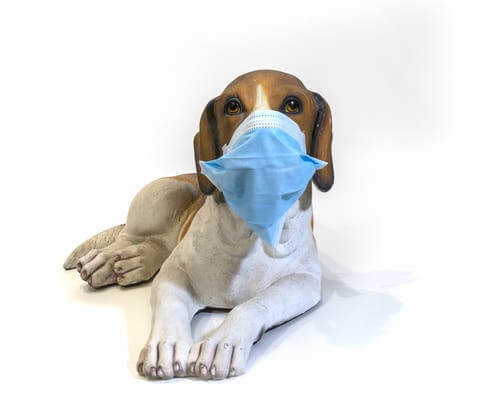How to Prevent the Spread of Flu in Pets

It’s widely known that many animals can suffer from the flu. This virus is found in many different species and can cause sneezing, breathing problems, general weakness, fever, and other symptoms besides. Are you taking any measures to stop the spread of flu in pets? Would you know what to do if your pet was unlucky enough to catch it? Here, we’ll tell you what to do.

What is the flu?
The flu is an infectious disease caused by influenzavirus A or influenzavirus B, which are both RNA viruses belonging to the Orthomyxoviridae family.
Influenza B viruses affect only humans, but Influenza A can affect a wide range of species, although rarely humans. However, you’re probably aware of a couple of examples, such as bird flu or swine flu. These are zoonotic viruses, which means that they can be transmitted from animal to human.
In any case, if your pet comes down with the flu, there’s no need to panic. The spread of flu from cats and dogs to humans is practically impossible, since the microorganisms that cause it are different, even if the symptoms are similar.
Although the mortality rate from influenza in pets is negligible, these viral strains are still highly contagious between animals of the same species. This can be even worse in confined areas where lots of animals live, such as at an animal shelter or a zoo.

Prevention is the first step
Here are is a list of tips to avoid the spread of flu in pets and make sure that your pet suffers as little as possible:
- Prevention is the first step. Studies have shown that influenza viruses are more stable and stay in the air longer in cold, dry climates. Therefore, avoiding exposing your pet to open windows or drafts is definitely recommended.
- If you suspect that your pet has caught the flu, you should go to a vet as soon as possible. As well as the symptoms we described earlier, one that is usually reliable is body temperature. For example, a dog’s body temperature should be between 100 and 102 degrees. Anything higher suggests that something is wrong.
- If your pet definitely has the flu, it’s best to isolate them from other animals. If your pet is a rabbit or rodent and they share a home, it’s always good to have a separate cage for this situation. Your sick pet should recover away from the rest of the animals to avoid infecting them.
- With social animals like dogs, it’s a good idea to limit their contact with other dogs. If you have more than one dog at home, you’ll need to make sure that you clean any surfaces that your dog vomits on. This includes disinfecting anything they might share with other dogs, such as feeders, toys, and blankets.
- Limiting contact with other dogs is also a good idea when going for a walk. Avoid taking them out at busy times and try to keep them away from other people’s pets. There’ll be time for fun and games once they’ve recovered.

Well, that’s the spread of flu in pets, but how can you protect yourself?
Although the flu isn’t uncommon, there are various other diseases that might show similar symptoms. So, after taking your pet to the vet, it’s a good idea to also take steps to protect your own health. The CDC (Center for Disease Control and Prevention) provides the following guidelines:
- Make sure you wash your hands frequently, especially after touching animals, and avoid direct contact with their feces.
- Immediately collect your pet’s feces and dispose of it using gloves and taking extreme hygiene measures.
- Under no circumstances should you handle food after interacting with your pet.
With all these prevention measures, you’ll be going far to prevent the spread of flu in pets, whether your own pets or other people’s. But always make sure that you get a diagnosis. Don’t try to treat anything yourself if you suspect the flu, because you can never rule out something more serious. Speak to a vet if you have any doubts.
All cited sources were thoroughly reviewed by our team to ensure their quality, reliability, currency, and validity. The bibliography of this article was considered reliable and of academic or scientific accuracy.
- Influenza en animales, CDC. Recogido a 26 de abril en https://espanol.cdc.gov/flu/other/index.html
- Animales (zoonóticos), CDC. Recogido a 26 de abril en https://www.cdc.gov/parasites/es/animals.html
